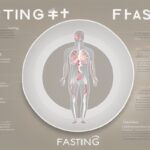Hey there, fellow health enthusiasts! If you’ve been curious about the incredible fasting benefits and how they extend beyond physical wellness, you’re in for a treat. Today, we’re diving deep into the fascinating world of fasting for mental health. While fasting is often associated with weight loss or detoxification, emerging research and personal stories suggest it can be a powerful tool for enhancing mental clarity, reducing stress, and even combating symptoms of anxiety and depression. Whether you’re a seasoned faster or just exploring intermittent fasting benefits, this post will unpack how abstaining from food for specific periods can nourish your mind. Let’s explore the science, practical tips, and real-world applications to help you harness these mental health fasting advantages.
What Is Fasting, and How Does It Relate to Mental Health?
Fasting, at its core, is the voluntary abstinence from food and sometimes drink for a set period. It comes in various forms, like intermittent fasting (cycling between eating and fasting windows), prolonged fasting (lasting several days), or time-restricted eating. While fasting has roots in cultural and spiritual practices, modern science is uncovering its profound effects on the brain. The connection between fasting and mental health lies in how it influences brain chemistry, stress hormones, and inflammation—key factors in conditions like anxiety and depression. For instance, fasting can trigger a process called autophagy, where cells clean out damaged components, potentially protecting brain cells from degeneration (Mattson et al., 2017). So, when we talk about fasting benefits, we’re not just looking at a slimmer waistline but a sharper, calmer mind.
The Science Behind Fasting Benefits for Mental Health
Let’s geek out for a moment on the science. Fasting impacts mental health through several biological mechanisms. First, it boosts the production of brain-derived neurotrophic factor (BDNF), a protein that supports neuron growth and protects against stress-related damage. Low BDNF levels are often linked to depression, and studies show fasting can increase its production (Martin et al., 2009). Second, fasting reduces inflammation in the body and brain, which is significant since chronic inflammation is associated with mood disorders (Fond et al., 2014). Additionally, fasting stabilizes blood sugar levels, preventing the spikes and crashes that can exacerbate irritability or brain fog. These mental health fasting benefits aren’t just theories—they’re backed by research showing how fasting can act as a natural mood enhancer. It’s like giving your brain a reset button!
Fasting and Stress Reduction: A Calmer Mind
One of the most celebrated fasting benefits for mental health is its ability to lower stress. When you fast, your body shifts into a state of mild stress (a good kind called hormesis), which actually strengthens resilience over time. Fasting also lowers cortisol levels—the stress hormone—helping you feel more relaxed (Cahill, 2006). I’ve personally noticed that after a 16:8 intermittent fasting day (16 hours fasting, 8 hours eating), I’m less reactive to daily frustrations. It’s not magic; it’s your body adapting to function efficiently under controlled stress. If you’re constantly frazzled, incorporating fasting might just be the mental breather you didn’t know you needed.
- Start Small: Begin with a 12:12 intermittent fasting schedule to ease your body into stress adaptation.
- Stay Hydrated: Dehydration can mimic stress, so drink plenty of water during fasting windows.
- Practice Mindfulness: Pair fasting with meditation to amplify stress reduction effects.
- Avoid Overdoing It: prolonged fasting without preparation can spike stress, so build up gradually.
Can Fasting Improve Mood and Combat Depression?
Here’s where things get really exciting: fasting’s potential to lift your mood. Research suggests that fasting can influence neurotransmitters like serotonin and dopamine, which play a huge role in how happy or motivated we feel. A study on intermittent fasting showed participants reported improved mood and reduced depressive symptoms after just a few weeks (Hussin et al., 2013). This ties back to the increase in BDNF and the reduction of oxidative stress in the brain. While fasting isn’t a cure for clinical depression, these fasting benefits suggest it could be a complementary strategy alongside therapy or medication. Imagine feeling a bit lighter emotionally just by tweaking when you eat—it’s a small change with potentially big rewards.
Practical Tips to Maximize Mental Health Fasting Benefits
Now that we’ve covered the ‘why,’ let’s talk about the ‘how.’ Fasting for mental health isn’t about starving yourself or pushing to extremes—it’s about intentional, sustainable habits. I’ve tried various fasting methods over the years, and I’ve learned that preparation and mindset are everything. Whether you’re aiming for the psychological benefits of fasting or just curious about its effects on focus, these tips will help you get started safely and effectively. Remember, the goal is to feel better, not burdened, so listen to your body as you explore these fasting advantages for mental health.
- Choose the Right Method: Try intermittent fasting (like 16:8) if you’re new, as it’s less intimidating than multi-day fasts.
- Break Fasts Wisely: Opt for nutrient-dense foods like nuts or avocados to avoid mood swings from sugar crashes.
- Track Your Mood: Keep a journal to note how fasting affects your emotions—data helps personalize your approach.
- Consult a Professional: If you have a history of mental health issues, speak with a doctor before starting.
- Rest Well: Fasting can be taxing, so prioritize sleep to support mental recovery.
Potential Risks and How to Avoid Them
While the fasting benefits for mental health are promising, it’s not a one-size-fits-all solution. fasting can sometimes trigger irritability (hello, hanger!) or worsen conditions like eating disorders if not approached mindfully. There’s also a risk of nutrient deficiencies if fasting isn’t balanced with proper nutrition during eating windows (Johnstone, 2015). The key is to be honest with yourself about your starting point. If you’re prone to anxiety, start slow and monitor how you feel. Fasting should enhance your mental well-being, not detract from it. Always prioritize safety over speed when chasing those mental health fasting gains.
In wrapping up, it’s clear that the fasting benefits for mental health are more than just hype—they’re grounded in science and real-life potential. From reducing stress to boosting mood through biological tweaks like BDNF production and inflammation control, fasting offers a unique way to support your mind. It’s not a magic pill, but when done thoughtfully, it can be a game-changer in your wellness toolkit. So, why not give it a try? Start with a simple fasting schedule, stay curious about how your body and mind respond, and remember that small steps lead to big shifts. Here’s to clearer thoughts and calmer days ahead—let’s fast our way to better mental health together!
References
- Cahill, G. F. (2006). Fuel metabolism in starvation. Annual Review of Nutrition, 26, 1-22. https://doi.org/10.1146/annurev.nutr.26.061505.111258
- Fond, G., Macgregor, A., Leboyer, M., & Michalsen, A. (2014). Fasting in mood disorders: Neurobiology and effectiveness. Psychiatry Research, 209(3), 253-258. https://doi.org/10.1016/j.psychres.2012.12.018
- Hussin, N. M., Shahar, S., Teng, N. I., Ngah, W. Z., & Das, S. K. (2013). Efficacy of fasting and calorie restriction on mood and quality of life. Physiology & Behavior, 121, 89-95. https://doi.org/10.1016/j.physbeh.2013.02.018
- Johnstone, A. (2015). Fasting for weight loss: An effective strategy or latest dieting trend? International Journal of Obesity, 39(5), 727-733. https://doi.org/10.1038/ijo.2014.214
- Martin, B., Mattson, M. P., & Maudsley, S. (2009). Caloric restriction and intermittent fasting: Two potential diets for successful brain aging. Ageing Research Reviews, 5(3), 332-353. https://doi.org/10.1016/j.arr.2006.04.002
- Mattson, M. P., Longo, V. D., & Harvie, M. (2017). Impact of intermittent fasting on health and disease processes. Ageing Research Reviews, 39, 46-58. https://doi.org/10.1016/j.arr.2016.10.005






